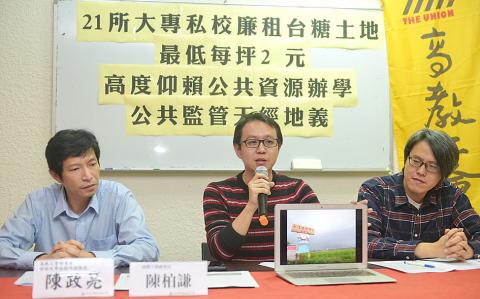Twenty-one private universities and colleges have been renting land from state-owned Taiwan Sugar Corp (Taisugar) for a monthly average of NT$7.6 (US$0.25) per ping (3.3m2), with some paying as little as NT$2.2 or NT$2.3 per ping, suggesting that private universities lack government oversight, the Taiwan Higher Education Union said yesterday.
The union has obtained details on 21 of 61 private universities and colleges that are renting land from the company at a preferential rate of 40 percent off the land’s market value as part a program designed to help schools, union researcher Chen Po-chien (陳柏謙) told a news conference in Taipei.
In more than 80 percent of the schools, more than 70 percent of the land belongs to Taisugar, he said, adding that three private universities — TransWorld University, Taiwan Shoufu University and Tzu Hui Institute of Technology — are entirely built on Taisugar land.

Photo: Chang Chia-ming, Taipei Times
The program has helped each private university save NT$20 million to NT$300 million over the past 50 years, he said, adding that the discount means that the universities profited NT$3.1 billion from government funds.
Given the discounted rent and other government subsidies granted to private universities, the Ministry of Education should increase supervision of school boards and ensure that publicly donated assets are returned to the government, parties or individuals when universities shut down, Chen said.
According to a bill to govern the transformation and closure of private universities and colleges approved by the Executive Yuan in 2017, a school board could maintain control over the school’s assets after it is transformed into a cultural or social welfare institute, he said.
While the bill has yet to pass a legislative review, the union fears it could encourage “irresponsible” school boards to deliberately close down universities to transform them into a more profitable business with government support, Chen said.
For example, the board of Yung Ta Institute of Technology and Commerce has continued to pay a yearly rent of NT$7 million to Taisugar after all faculty and students left following its closure in 2014, probably in an attempt to maintain control over the land and other public assets, he said.
“This is a double waste because the land could be put to better use if Taisugar were not renting it to the school, and the rent the school has been paying could have been used to pay the salaries it owed its teachers,” Chen said.
“In the near future, many private schools will shut down because of the declining birthrate. Their public assets should be immediately returned to local and central governments, and redistributed to schools that need them,” he said.
The ministry should also require the 21 universities to have representatives from civil groups, faculty and students on their board of directors to enhance supervision of their operations, he said, adding that teachers’ and students’ rights should be ensured when schools undergo closures or transformation.

ANOTHER EMERGES: The CWA yesterday said this year’s fourth storm of the typhoon season had formed in the South China Sea, but was not expected to affect Taiwan Tropical Storm Gaemi has intensified slightly as it heads toward Taiwan, where it is expected to affect the country in the coming days, the Central Weather Administration (CWA) said yesterday. As of 8am yesterday, the 120km-radius storm was 800km southeast of Oluanpi (鵝鑾鼻), Taiwan’s southernmost tip, moving at 9kph northwest, the agency said. A sea warning for Gaemi could be issued tonight at the earliest, it said, adding that the storm is projected to be closest to Taiwan on Wednesday or Thursday. Gaemi’s potential effect on Taiwan remains unclear, as that would depend on its direction, radius and intensity, forecasters said. Former Weather Forecast

As COVID-19 cases in Japan have been increasing for 10 consecutive weeks, people should get vaccinated before visiting the nation, the Centers for Disease Control (CDC) said. The centers reported 773 hospitalizations and 124 deaths related to COVID-19 in Taiwan last week. CDC Epidemic Intelligence Center Director Guo Hung-wei (郭宏偉) on Tuesday said the number of weekly COVID-19 cases reported in Japan has been increasing since mid-May and surpassed 55,000 cases from July 8 to July 14. The average number of COVID-19 patients at Japan’s healthcare facilities that week was also 1.39 times that of the week before and KP.3 is the dominant

The Chinese Communist Party’s (CCP) working group for Taiwan-related policies is likely to be upgraded to a committee-level body, a report commissioned by the Mainland Affairs Council (MAC) said. As Chinese President Xi Jinping (習近平) is increasingly likely to upgrade the CCP’s Central Leading Group for Taiwan Affairs, Taiwanese authorities should prepare by researching Xi and the CCP, the report said. At the third plenary session of the 20th Central Committee of the CCP, which ended on Thursday last week, the party set a target of 2029 for the completion of some tasks, meaning that Xi is likely preparing to

US-CHINA TRADE DISPUTE: Despite Beijing’s offer of preferential treatment, the lure of China has dimmed as Taiwanese and international investors move out Japan and the US have become the favored destinations for Taiwanese graduates as China’s attraction has waned over the years, the Ministry of Labor said. According to the ministry’s latest income and employment advisory published this month, 3,215 Taiwanese university graduates from the class of 2020 went to Japan, surpassing for the first time the 2,881 graduates who went to China. A total of 2,300 graduates from the class of 2021 went to the US, compared with the 2,262 who went to China, the document showed. The trend continued for the class of 2023, of whom 1,460 went to Japan, 1,334 went to